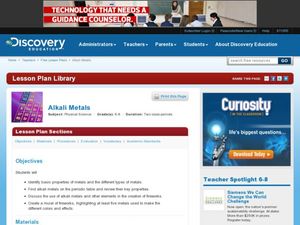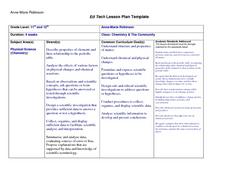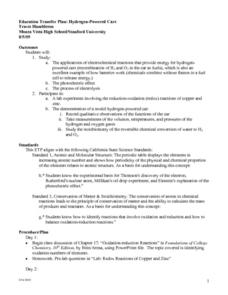Cornell University
Bacteria Take Over and Down
Bacteria outnumber all other forms of life on Earth. Scholars observe the growth of bacteria in petri dishes to understand their role in maintaining good health. Then, they observe the growth of bacteria after they introduce...
Curated OER
Gases and Plasmas
Students determine what plasma is and why the sun is made up of plasma. They recognize situations where plasmas are found in nature and made by man. They discuss why the sun is a huge ball of plasma and if there are different levels of...
Curated OER
Crystals: What Are They and What Holds Them Together
Students are introduced to the characteristics of crystals and what keeps them together. Using the Periodic Table, they examine the various elements and develop a model of an atom. In groups, they place sugar and salt in petri dishes...
Virginia Department of Education
Matter and Energy: Equations and Formulas
Using simple materials, an informative lesson demonstrates the Law of Conservation of Matter and explains how to balance chemical equations. Young chemists perform experiments, analyze reactions, and balance chemical equations on their...
Curated OER
Atomic Structure and Quantum Theory
Students are introduced to the structure of an atom and Dalton's atomic theory through a short video and mini-lecture. They also take a look at the weight of mass and become familiar with the idea of quantum theory
Curated OER
Ionic bonding
Students explore ionic bonding. They draw examples of ionic bonding and explain the activities of the electrons of the elements. Students use paper plates and candy to draw electron configurations of given atoms.
Curated OER
Properties of Metals
Fifth graders study the properties of metals and use them to identify different properties. In this metal properties instructional activity students complete a demonstration .
Curated OER
Ionic Chemical Formulas Days 1 & 2
Students study polyatomic ions and write binary and ternary ionic chemical formulas. They explore putting together different monatomic ions and coming up with as many chemical formulas as possible. They play a game similar to memory...
Curated OER
Chemical Formulas
Students assess how to go from writing ionic chemical formulas to nomenclature and naming chemical compounds. They brainstorm former studies and share their thoughts in small groups. A list of everyday products (shampoos, toothpaste,...
Curated OER
Semiconductors
Students investigate the properites of a semiconductor device known as a diode. They recognize a diode as a one way conducting device. They describe alternating current and the use of a diode to convert it to direct current. Students...
Curated OER
What is an Atom?
Third graders understand that the smallest particle is an atom. In this matter lesson, 3rd graders make a piece of aluminum smaller and smaller to see that what's left is still aluminum. Students recognize that cutting into smaller...
Virginia Department of Education
Molar Volume of a Gas
What is a chemist's favorite plant? Stoichiome Tree! Scholars produce hydrogen gas by reacting magnesium with hydrochloric acid. Then they calculate the molar volume of the gas produced before answering assessment questions.
Curated OER
Chemistry - Atoms and Elements
Learners perform varied activities as part of a layered curriculum unit: They write and perform a skit that outlines the evolution of the model of the atom. The script is submitted to the teacher for review before performance.
Curated OER
Objects in the Solar System
Eighth graders define a planet by the orbit around the sun, have a large enough gravitational force to hold a sphere shape and needs to clear the neighboorhood of it own orbital zone. They describe comets, meteoroids, meteor, meteorites...
Curated OER
What is Radon?
Learners read an article about radon and its properties. They examine a periodic table and identify the numbers surrounding an element. They discuss the harmful and helpful effects of radiation.
Curated OER
Roll or Attendance
Students stand for roll call in designated spots painted by the teacher. They stand on the alphabet, numbers, periodic table, and keyboard.
Curated OER
Alkali Metals
Middle schoolers explore the unique properties of alkali metals. For this chemistry lesson, students create a mural of fireworks display after researching its different element components. They write a brief description about an alkali...
Curated OER
Speeding up the Fizz
Students investigate temperature and chemical reactions. They explore the effect of temperature and particle size has on the rate of a simple chemical reaction. In addition, they graph their results and answer assessment questions.
Curated OER
The Noble Gases
Students identify the different elements that belong to the Noble Gas family. In this chemistry activity, students design a neon sign. They research how they are made and share their work with the class.
Curated OER
Chemistry & The Community
Students complete a Webquest which investigates the chemistry in items such as shampoo. They research the Internet, perform a lab experiment, and write a scientific lab report with their findings. Upon completion of the activities, the...
Curated OER
Oxidation and Salt
Students study the reaction on iron in water, air, and sodium chloride. They create a situation that shows this process and gives them the opportunity to hypothesize what, why, and how. They keep records and do an oral and written ...
Curated OER
Other Metals
Middle schoolers identify the properties of transition metals. In this chemistry lesson, students research facts and uses of one aluminum product they choose. They create an advertisement highlighting aluminum's useful properties.
Curated OER
Hydrogen Powered Cars
Students apply the principles of chemistry to investigate the concept of how a hydrogen powered car works. They study the electrochemical reactions that provide the energy source. Students also record observations in the functioning of a...
Curated OER
Mining an Ore
Students investigate how to determine the percent composition of a mineral in an ore. In this mining an ore lesson plan, students use chocolate chips cookies to represent an ore and they remove precious minerals (the chocolate chips)...

























